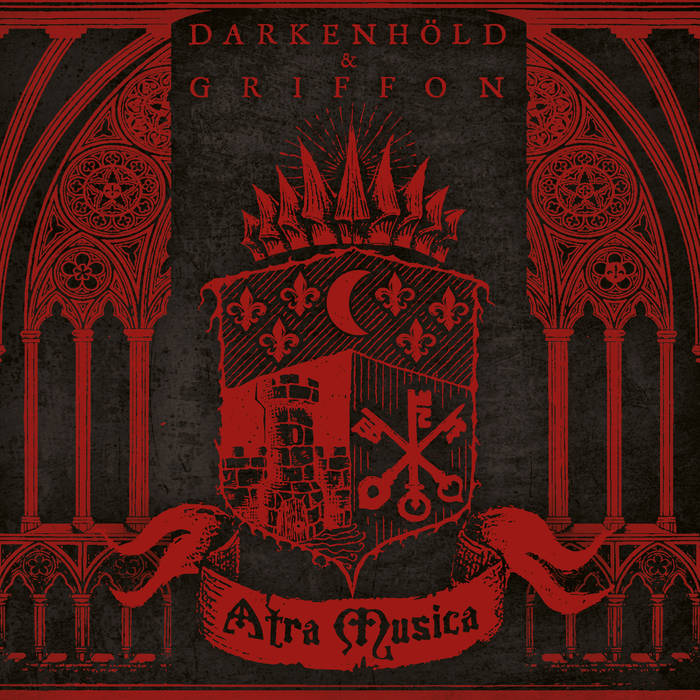
Split releases, when done properly, are not only a great way to introduce fans to new bands, but also a way to create a record that has a unique atmosphere thanks to careful pairing of artists. This release, featuring contributions from Darkenhold and Griffon, has been put together by the inestimable Les Acteurs De L’Ombre Productions (a label who very much favour quality over quantity and whose output is all but untouchable) and is, therefore, beautifully packaged in six-panel, blood-red digipack, complete with suitable grandiose artwork (Tedd – Mehxohorr Artowrks).
Opening the set, Griffon engage in epic, atmospheric black metal, the harrowing screams of Aharon set to epic soundscapes which incorporate acoustic guitars, prog-inspired lead work and icy riffs to devastating effect. Eight-minute opening track Si Rome Vient A Perir is the perfect introduction to the band, capturing their almost-Baroque sensibilities in full flow. The torrential riffing of Souviens toi, Karbala maintains the neo-classical approach, the music dynamic and complex even as the scabrous vocals seek to claw the listener down to the depths. Dense, almost-hypnotic, it is both majestic and monstrous and it leaves the listener gasping at the intense cold. Another lengthy composition, the sinister grind of Jerusalem sees harmonised guitars and blast beats conjuring up an atmosphere of dread aided by the heavily reverbed vocals. With deft shifts and occasional clean passages, Jerusalem is an album highlight. Griffon’s section ends with the Emperor-esque interlude which, as the name implies, provides a surprisingly elegant bridge to the second half of the record.
Opening Darkenhold’s section, marche des betes sylvestres emerges from a synth fog as a predominantly acoustic and folk-influenced piece. With vocals lost in a haze of reverb, it’s an unexpected take on black metal’s traditionally harrowing pastures and it recalls Ancient Vvisdom’s similarly ambient excursions. With flute, cello, violin and Jaw harp present in the mix, it’s a truly unconventional and interesting piece of music that requires several listens to truly get. It also makes the purpose of interlude that much clearer, the much-needed palette cleanser paving the way for Darkenhold’s oblique take on post-black-metal. Remaining in the strange, yet eerily addictive, realm of their own making, Darkenhold offer up the short, fast-paced le sanctuaire de la vouivre, the Jaw Harp particularly prominent amidst the mix. The spectral les goules et la tour benefits from the massed vocalisations that open the track, although the rendering of traditional black metal riffing on the acoustic feels less effective here and the lead vocal is all but buried in the mix. Final track citadelle d’obisdienne is a touch slower, and all the better for it, the complexity of the guitar work allowed to shine as the flute is brought in, once more, to leaven the atmosphere. It proves to be the highlight of Darkenhold’s section, the rich beauty of the piece given voice by the cello that appears mid-way into the track. It brings the album to an effective and memorable close.
Overall, it is arguable that Griffon’s more traditional take on black metal is the more consistently effective, but that’s not to dismiss the startlingly unique work of Darkenhold. Certainly, Griffon’s work is more immediately accessible, whereas Darkenhold benefit from several listens to truly grasp that ambitious scope of their material. An ambitious and imaginative pairing, Atra Musica sits very much to the left of traditional black metal and will not be for everyone, but for those who enjoy bands that aim to expand beyond the perceived limits of their chosen genre, there is much to enjoy here. 8.5



